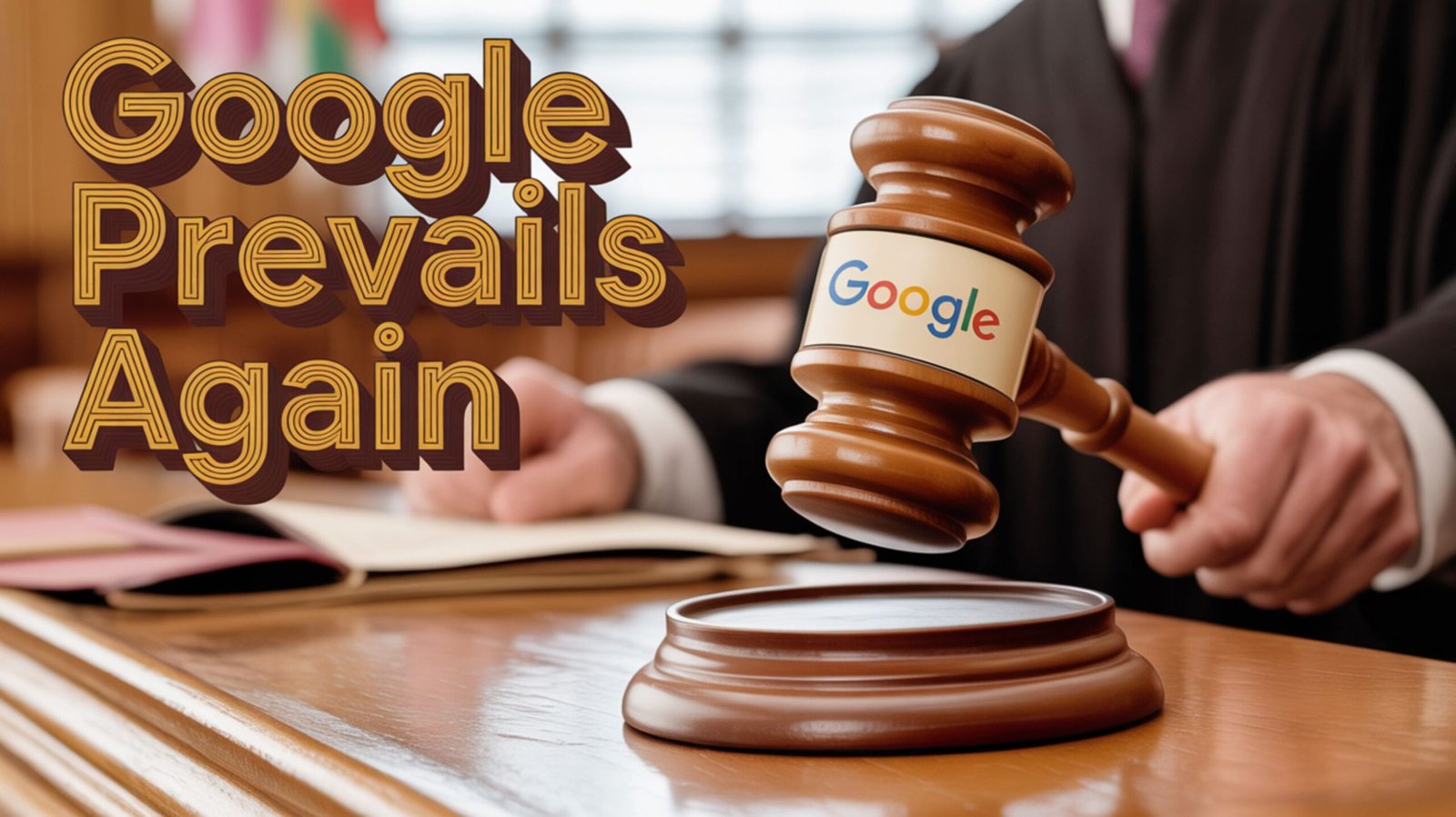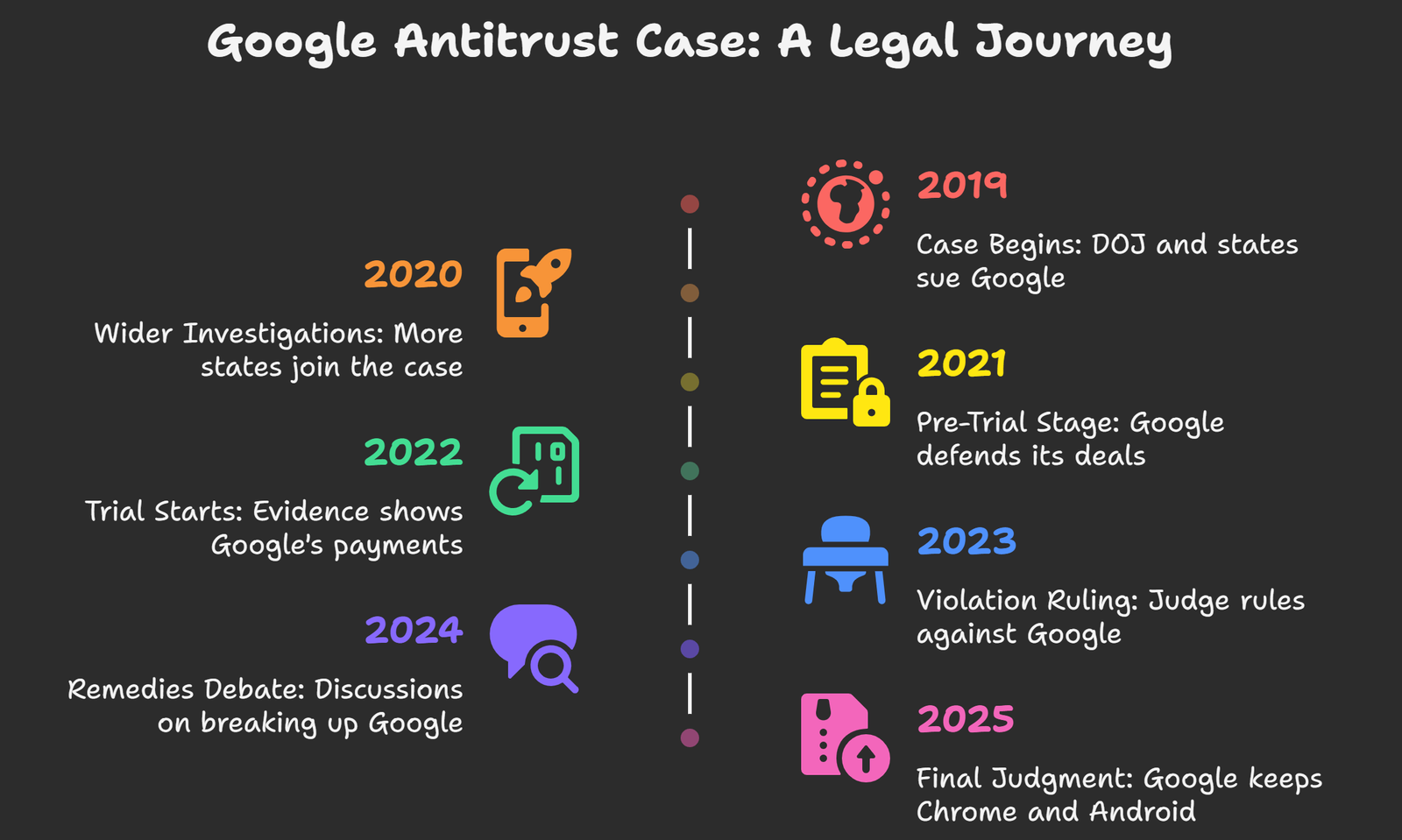Google Gets to Keep Chrome and Android– The long-running antitrust battle against Google reached a pivotal moment when a U.S. federal court ruled that the tech giant would not be required to sell its two most critical assets: Google Chrome and the Android operating system. This decision marks a turning point in one of the most significant legal showdowns in modern tech history, shaping how regulators, competitors, and consumers will view Google’s dominance in the digital world.
Background of the Antitrust Case Against Google
The U.S. Department of Justice and several state attorneys launched antitrust lawsuits against Google, alleging that the company maintained an illegal online search and advertising monopoly. At the heart of the dispute was whether Google’s exclusive deals with device manufacturers and carriers unfairly blocked competitors from gaining a foothold in search, browsers, and mobile platforms.
Judge Amit P. Mehta presided over the case and had previously ruled that Google violated antitrust laws. Regulators initially sought drastic remedies, including:
- Forcing Google to divest Chrome (the world’s most widely used browser).
- Requiring the company to spin off Android, the leading global mobile operating system.
- Mandating choice screens for users to select search engines or browsers upon setup.
- Imposing data-sharing obligations with rivals.
However, the final judgment failed to dismantle Google’s business empire, offering a more moderate set of remedies.

Court’s Decision: Google Keeps Chrome and Android
In its ruling, the U.S. District Court for the District of Columbia determined that Google would not face divestiture of either Chrome or Android. The judgment explicitly stated:
- No forced sale of Chrome: Google’s web browser remains entirely under its control.
- No divestiture of Android: The operating system continues to be an integral part of Google’s ecosystem.
- No mandatory choice screens: Users cannot select alternative browsers or search engines during device setup.
This outcome represents a significant victory for Google, as regulators had hoped to dismantle the company’s tightly integrated product ecosystem.
Restrictions on Preloading and App Bundling
Although Google kept its crown jewels, the court imposed restrictions on how the company can negotiate with Original Equipment Manufacturers (OEMs) and partners.
The ruling prevents Google from:
- OEMs must preload the Google Play Store, Chrome, or other Google apps in exchange for granting access to Search or Assistant.
- Entering into exclusive distribution agreements that tie its apps together in bundles.
However, the court also recognized that a complete incentive ban could hurt manufacturers and consumers. If these deals are not exclusive or coercive, Google can still offer payments or incentives for preloading its apps.
Impact on Google’s Business Strategy
The outcome will shape how Google conducts its partnerships moving forward. The company can no longer cement defaults across devices through exclusivity, but it retains the freedom to:
- Pay OEMs to promote Search, Chrome, or Gemini.
- Negotiate preload incentives that don’t require bundling.
- Preserve the Play Store as the primary app marketplace, without forced divestiture.
This balance allows Google to continue leveraging its market position while ensuring that device makers and consumers retain more flexibility in choosing their apps and services.
Why the Court Rejected a Breakup of Chrome and Android
Several factors influenced the court’s reluctance to force divestiture:
- Consumer Harm Concerns – Breaking up Android or Chrome could have led to fragmentation in the mobile ecosystem, reducing app compatibility and harming users.
- Hardware Maker Dependency – Many device manufacturers rely on Google’s ecosystem for stability and revenue, and a breakup could have had “crippling” consequences.
- Competitive Landscape – The court recognized that while Google dominates search, other browsers and operating systems (Safari, Firefox, iOS) remain active competitors.
- Precedent in Antitrust Remedies – U.S. courts rarely force breakups unless no other remedy is viable. Restrictions on contracts were seen as a less disruptive solution.
Reactions from Regulators and Industry Analysts
The decision has drawn mixed reactions:
- Regulators expressed disappointment, noting that Google retains overwhelming control in search and mobile markets. They argue the remedies may not go far enough to encourage meaningful competition.
- Industry analysts see the ruling as a pragmatic compromise. By blocking exclusivity while preserving incentives, the court avoided market disruption that could hurt consumers.
- Competitors like DuckDuckGo and Microsoft Bing may still face uphill battles in breaking Google’s dominance, but they now have clearer opportunities to compete on devices without being locked out.
The Future of Google’s Antitrust Battles
This ruling is not the end of Google’s legal troubles. The company faces ongoing antitrust cases in the European Union, India, and other jurisdictions, many of which are exploring tougher remedies.
Key areas under scrutiny include:
- Advertising Technology – Google’s dominance in programmatic ad auctions and data tracking remains a central concern.
- AI and Search Integration – With the rise of Gemini and AI-powered search assistants, regulators may push for transparency in how results are ranked and displayed.
- Market Behavior Monitoring – Courts and watchdogs may closely examine whether Google complies with the preloading restrictions imposed by this ruling.
What This Means for Consumers
For everyday users, the ruling translates to subtle but significant changes:
- Fewer forced defaults – New Android devices may provide more flexibility in what apps come preinstalled.
- Smoother ecosystem stability – By keeping Chrome and Android under Google’s control, users avoid potential disruptions caused by fragmentation.
- Continued innovation – Google can continue investing heavily in Chrome, Android, and Gemini without the uncertainty of divestiture.
While consumers may not see immediate, dramatic differences, the long-term effect could be a more open market with greater freedom of choice.
Weap Up: A Defining Moment for Big Tech Antitrust Enforcement
The federal court’s decision to let Google keep Chrome and Android marks one of the most consequential rulings in the ongoing battle between regulators and Big Tech. Although the company avoided a forced breakup, it now faces tighter restrictions on maintaining its dominance.
This ruling sets a precedent for how regulators balance consumer protection, market competition, and technological stability. For Google, it represents a strategic victory and a reminder that scrutiny over its market power is far from over.

Selva Ganesh is a Computer Science Engineer, Android Developer, and Tech Enthusiast. As the Chief Editor of this blog, he brings over 10 years of experience in Android development and professional blogging. He has completed multiple courses under the Google News Initiative, enhancing his expertise in digital journalism and content accuracy. Selva also manages Android Infotech, a globally recognized platform known for its practical, solution-focused articles that help users resolve Android-related issues.




Leave a Reply